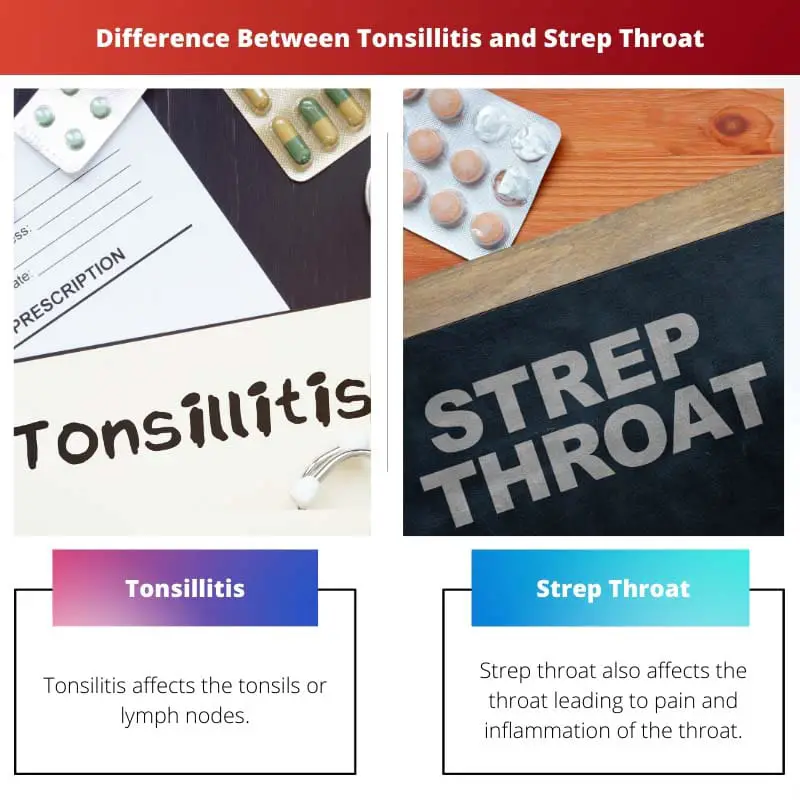The term ‘throat’ refers to the tube that is responsible for carrying food to our oesophagus. It also carries oxygen to our larynx and windpipe.
Various problems are known to affect the threat, some of which are very common. Many throat problems do not require medical attention and go away on their own.
Common throat problems include tonsilitis, laryngitis, etc.
Key Takeaways
- Tonsillitis refers to inflammation of the tonsils, whereas strep throat is a bacterial infection caused by Streptococcus bacteria.
- Tonsillitis can result from viral or bacterial infections, while strep throat is exclusively bacterial.
- Strep throat requires antibiotic treatment, while tonsillitis treatment depends on the cause (antibiotics for bacterial infections, rest and supportive care for viral infections).
Tonsillitis vs Strep Throat
Tonsillitis can be caused by various viral and bacterial infections, whereas group A Streptococcus bacteria cause strep throat. Strep throat tends to be more severe and may lead to complications if left untreated, while tonsillitis can be managed with home remedies and over-the-counter medications.

Tonsilitis affects the tonsils or lymph nodes. Tonsils are the part of the body that protects it from diseases by producing white blood cells.
These cells prevent bacteria and viruses from entering the body.
This infection can occur in people of all ages. Being contagious, it can easily spread through coughing and sneezing.
Strep throat also affects the throat leading to pain and inflammation of the throat. This, too, is highly contagious and spreads through sneezing and coughing.
It is most common in school-going children that are exposed to a variety of viruses and bacteria. Doctors identify it through a throat culture test that tests the presence of Streptococcus bacteria.
Comparison Table
| Parameters of Comparison | Tonsillitis | Strep Throat |
|---|---|---|
| Causative agent | Caused by viruses such as influenza A, herpes simplex virus, Epstein-Barr virus, etc and Streptococcus bacteria | Caused by Streptococcus bacteria |
| Causes | Inflammation of the tonsils | Infection in the throat |
| Symptoms | Voice changes, stiff neck, and other symptoms | Bad breath, chills among other symptoms |
| Rheumatic fever | Does not cause rheumatic fever | Can cause rheumatic fever |
| Reaction to antibiotics | Generally does not react; it is self-limiting | Resolved by antibiotics |
What is Tonsilitis?
Tonsilitis is an inflammation of the tonsils. It is also known as sore throat, as this is the main symptom.
Tonsils are oval-shaped and situated at the backside of our throat. They are the largest in children and become smaller with age.
They act as the first line of defence against infection, though it is also susceptible to infections. Some of the symptoms of tonsilitis are as follows:
- Sore throat
- Fever
- Earaches
- Difficulty in swallowing
Even though they can occur at all ages, it is most common in children as they are exposed to various bacteria and viruses when they go to school.
Children may also become irritable and refuse to eat. Both bacteria and viruses may cause them and are contagious.
The bacteria causing tonsilitis is the same as for strep throat, so the doctor differentiates between the two infections by a rapid strep test.
A rapid viral nasopharyngeal swab test can also be done to check the presence of certain viruses. They cause discomfort but go away on their own.
Antibiotics do not work in this case.
Common measures that can be taken to fight tonsilitis are as follows:
- Drinking a lot of fluids
- Avoiding citrus fruits that irritate the throat
- Drinking warm drinks
- Gargling with saltwater
- Avoiding smoke and irritants

What is Strep Throat?
Strep throat is an infection of the throat caused by Streptococcus bacteria. Symptoms are quite visible, and they most affect children more than adults in the age group of five to fifteen.
They cause immense pain and have persisting symptoms. Common symptoms of this infection are as follows:
- Headache
- Vomiting or nausea in children
- Chills and fever
- Swollen lymph nodes in the neck.
It causes Scarlet fever, evident as a bright red rash in people susceptible to the poisons of the bacteria S. pyrogenes.
When left untreated, it is known to cause scarlet fever in one out of ten children. It also leads to rheumatic fever in some cases.
This disease affects joints, the heart, the brain, and the skin. Some of the symptoms include:
- Abdominal pain
- Nose bleeds
- Skin lumps
- Fever
It is treated with several over-the-counter medications called antibiotics. Usually, penicillin or amoxicillin is used to treat this.
While tonsillitis goes away on its own, it is necessary to treat strep throat in the early stages; otherwise, serious complications may occur.
Home remedies for strep throat are almost the same as tonsilitis.
To prevent exposure to this infection, one should wash hands frequently and properly, avoid the sick, and not share utensils or cups with the sick, among other preventive measures.

Main Differences Between Tonsillitis and Strep Throat
- Both Streptococcus bacteria and other viruses cause tonsillitis. On the other hand, Strep throat can be caused by exposure to group A Streptococcus bacteria.
- Tonsilitis leads to inflammation of the tonsils, whereas strep throat is an infection of the throat.
- Common symptoms of tonsilitis include voice changes, stiff neck, etc., whereas, for strep throat, it is bad breath, chills, etc.
- If not treated, tonsilitis goes away on its own. On the other hand, if strep throat is left untreated, complications such as rheumatic fever and scarlet fever.
- Antibiotics do not work on the viruses that cause tonsilitis, whereas antibiotics mainly resolve strep throat.

- https://jamanetwork.com/journals/jama/article-abstract/193357
- https://www.ncbi.nlm.nih.gov/pmc/articles/PMC2907808/

The article is very detailed, but the comparison table makes it a bit too complex.
The way this article is written is confusing. There are too many technical terms and it is not easy to understand.
The article does not make it clear what the causes are of each condition. There is only a confusing and overcomplicated comparison chart.
The article does not make it clear what the causes are of each condition. There is only a confusing and overcomplicated comparison chart.
The detail in this article is fantastic. It is very informative and has valuable information.
This article is very informative. It is useful for understanding the differences between tonsillitis and strep throat.